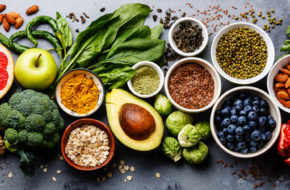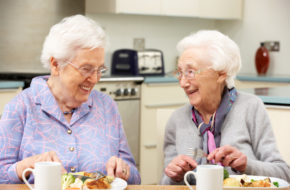From keto to gluten-free to vegan and more, fad diet options abound. But are these eating plans a healthy choice for older adults?
And the question has become especially important, as more people eat in and cook at home as they shelter-in-place related to the current pandemic from the SARS-CoV-2 virus.
Two registered dietitians with Morrison Community Living, Diakon’s culinary services partner, Samantha Griffith, RD, LDN, the nutrition care manager at Ohesson in Lewistown, Pennsylvania, and Connor Forlini, MS, RDN, LDN, nutrition care manager at Cumberland Crossings near Carlisle, Pennsylvania, provide insights. As in most cases, if you have specific questions about your own diet, please consult your health-care professional.
One common theme among many fad diets is that something must be eliminated for the diet to be successful: cut carbs or eliminate wheat or eat virtually no fats.
“That’s the first red flag,” says Griffith. “As dietitians, we promote the idea that everything is okay in moderation. People don’t like to hear that, though. They think it’s easier to cut just one thing and magically lose weight.”
Take the ketogenic, or “keto,” diet, for example. According to Griffith, the diet calls for reducing carbs so drastically that you are tricking your body into starvation mode and producing ketones from fat to create energy.
“The problem is that it’s awful for your metabolism; you start to feel fatigued and it’s just not sustainable for the long-term,” she says.
Or the gluten-free diet. Unless you have celiac disease, Griffith says, there’s no advantage to cutting out gluten.
“Gluten is a protein in wheat, rye and barley with no caloric value,” she says. “If you can’t tolerate it, gluten can create serious digestive issues. But a lot of people follow the diet and cut out grains. If you do that, you cut out an important source of B vitamins, fiber and other nutrients. Grains also often are fortified with iron, which a lot of older adults struggle to get enough of. Getting iron from dietary sources, including fortified grains, helps you avoid taking iron pills.”
Griffith’s advice is to instead modify your diet to reduce your carbs overall, but not completely. Not all carbs are bad.
Forlini adds that carbs are often misunderstood. Older adults may just need more education on them, he says.
“Your doctor may tell you to limit your carb intake,” he says. “That really means empty carbs, like sugar. And it doesn’t mean you can’t ever have a sweet dessert. Just have a smaller piece,” although that advice may vary for people with diabetes, who should follow physician recommendations on carb-intake.
Because many older adults deal with health issues such as heart disease and high blood pressure, Forlini notes that culinary services at Diakon vary menus, with less red meat and meatless options. Most foods are prepared in-house from scratch, he explains, and use low-sodium products or are made only with naturally occurring salt and no added sodium.
“We learn about residents’ diet history, their medical history, what foods and drinks they like,” he says. “We don’t tell them they can’t have this or that food. We always offer alternatives.”
Griffith and Forlini agree that fad diets aren’t the answer if you’re trying to eat healthier. Here are five suggestions they make for greater success:
• Forget the word “diet.” Think lifestyle changes, Griffith says. “You are changing habits versus cutting things out.”
• Make small changes, gradually. You are more likely to stick with the diet than if you overhaul your entire way of eating all at once.
• Don’t cut out complete food groups. If you’ve read that fruits are high in sugar, that doesn’t mean you stop eating them altogether. “Many fruits are good sources of minerals, fiber and anti-oxidants,” Forlini says.
• Have pizza or a slice of your friend’s birthday cake—just don’t do it every day and pay attention to the carb count if you are diabetic. Good nutrition is not made or broken in one day, Griffith says. “I call those kinds of food good for the soul; we all need those.”
• Think of the foods you eat as helping you fight disease. “The American health-care system is more reactive, treating people after they get sick,” Forlini says. “Dietitians and nutritionists are “pro-active,” using food to prevent or reduce the disease state.”
If you’re looking for a tried-and-true approach to healthy eating, Griffith and Forlini recommend the Mediterranean food plan. It focuses on eating smaller portions of meat, more seafood, plenty of vegetables, healthy fats and whole grains.



